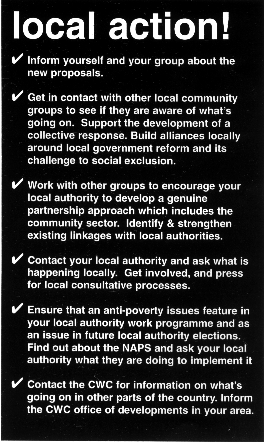|
Each local
authority has responsibility for establishing the
SPC structure in their area, within the framework
set out by the guidelines issued by the
Department of the Environment and Local
Government.
To do this, an SPC
Scheme, outlining how it is proposed to establish
the new structure is prepared and put before the
elected members of the local authorities for
approval. This scheme will usually set out the
nature and number of Strategic Policy Committees
and the number of participants on them.
While the
guidelines loosely spoke of the establishment of
four SPC’s many local authorities appear to
be creating more than this, usually five or
sometimes six SPC’s.
The CWC has
contacted all local authorities to remind them of
the commitments made in the guidelines on the
inclusion of the community
/ voluntary / disadvantage sector and to urge
them to carry out a detailed local consultation
in advance of the selection of
"external" SPC members from this
sector. We have also requested details of
individual SPC schemes.
To date a total of
25 to 34 local authorities have responded, with
varying degrees of interest. Overall though, the
response of local authorities has been
encouraging, though little information on SPC
schemes has been forthcoming.
The CWC is also
working to support local authorities in the
development of local consultation mechanisms and reminding
them that it is the community
/voluntary/disadvantaged sector itself which
should choose its representatives on the SPC`s.
Over the coming
months the CWC will remain in contact with local
authorities and will be attempting to secure
resources to enable us to support the community
sector locally in accessing the SPC`s.
|
The State agencies
must be active, flexible and willing participants in the
process of tackling social exclusion. This means defining
and supporting a culture of partnership and participation
and a willingness to listen, especially to those who have
genuine needs... ! would emphasise that, in the area of
local government, the local community based partners must
play a vital role and adequate time must be given to
ensure that any structural reforms reflect the importance
of their inclusion. We will exclude such groups at the
expense of sustainable long-term local development and
social inclusion. |
